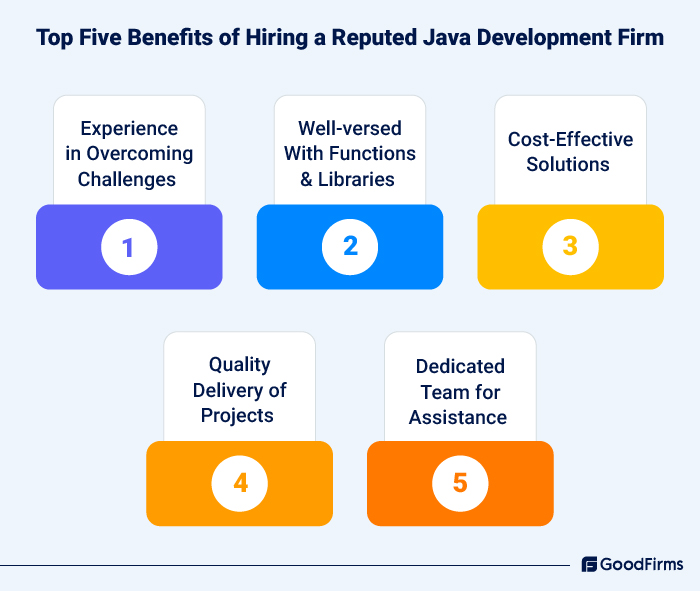Java is the most popular programming language in the world, thanks to its platform independence, utmost ease of use, and cross-platform compatibility. Being a highly demanded programming language, Java is used by many to build games, web platforms and many other myriad of applications across various industries. Many businesses opt for Java-backed applications because of the sleek user interface and for the sake of convenience among the customers. However, having an in-house Java development talent can be costly, time-consuming and may not always provide the desired results. Here’s where hiring top Java development companies comes in the picture.
In this article, we will explore various facets of the Java programming language and understand the five cost-effective benefits of hiring a Java development firm for your business. From specialized skills to quick turnaround quality work - there are multiple reasons why you should get a Java development firm on board.
What is Java? Why is it So Popular?
“Write Once, Run Anywhere” - Sun Microsystems
Back in the mid 1990s, Sun Microsystems created the Java programming language which was later acquired by Oracle Corporation, who currently owns and maintains the Java platform. Today, Java is the most popular programming language, widely used in the world.
There are a multitude of reasons why Java is so popular. First and foremost, Java is known for its simplicity, portability and the top-notch security features. These qualities have made Java an impeccable option in the tech industry. It’s one of the most fascinating and popular programming languages in the world. Developers from different niches and industries incorporate the usage of Java for web and mobile app development software, game development, desktop software, and so much more. Because Java is a portable language, all it takes for the developer to write the program once and then it’s possible to run it anywhere which thereby proves Java to be an efficient language.
Another reason why Java is famous is because of the wide range of development tools and libraries that are accessible. There are numerous Java Development Kits (JDK) available that offer a wide range of tools and frameworks for the development in the best possible manner. In 2020, Oracle was the most famous JDK available covering 75% of the market. Today, Amazon tops that position. Additionally, the Java API also known as Application Programming Interface comprises pre-built libraries and functions that the developers can fetch into their projects without any prerequisite of writing the code.
For a new programmer, it can be overwhelming in understanding the wide scope of Java. Thankfully, there’s a large community of developers and users available to provide support and resources to the beginners. Through the online communities and forums, open-source libraries, developers have a wealth of knowledge that can solve their issues, upskill, and stay updated with the latest trends in Java development.
To sum it up due to its advanced technology layers, swift interface, simplicity, and security, Java is widespread use across different industries.
What is Java Development? (Java API, Java Virtual Machines)
Java development is the process of writing the code and creating the applications using the Java programming language. Since it is an object-oriented programming language which offers platform independence, developers can write the code and run it anywhere. Be it on personal computers or servers - Java is portable and scalable. There are various tools like IDEs (Integrated Development Environment) available that can be used for Java development. Some of the most popular ones are Eclipse and NetBeans.
In order to create Java-based software applications, developers will require specific building blocks. Here’s where the Java API (Application Programming Interface) comes in handy. It’s a collection of software components and tools that will make it easier for the programmers to write the code faster with minimal errors. There are multiple frameworks, libraries and development tools under the Java API that can be utilized for the creation of software applications.
Once the developer writes the code, then it’s time to execute the Java applications. A Java Virtual Machine (JVM) is a runtime environment that will launch the Java application. Through JVM, the Java bytecode will get translated into machine language which will permit the application to run it anywhere as long as there’s a JVM installed. Because of this reason, Java is platform independent and ensures that the Java application runs appropriately on different operating systems and hardware. As per the Statistics on Java Popularity by Oracle, there are 45 billion active Java Virtual Machines.
The amalgamation of these three components together makes Java an ever-so-versatile programming language which continues to remain a top position among the developers.
Understanding Java Development Process & Lifecycle
For the creation of any Java-based software application, it is crucial to overview about the development process and lifecycle. The Java development process and life cycle begins with the requirement analysis followed by design, implementation, testing, deployment, and maintenance. For developers this is the most important step as it will guide them in creating reliable and efficient Java applications.
In requirement analysis the developers will attentively work with the clients and stakeholders to understand their narrative regarding the scope, features, and goals to accomplish via applications. This first step will build the foundation for the entire development process and pave the way forward for application development.
Right after the requirement analysis step, the developers will step on the designing phase of the application. This will comprise of curating a blueprint of the application. It will highlight the basic functionalities, architecture, technology stack, UX, and data models that will be incorporated during the process. One of the core reasons for conducting the designing step with the stakeholders is to understand the vision and remain on the same page.
The next iteration involves writing the code and integrating different components of the application together. This is the step where the developers spend most time in producing a prototype. It requires expertise in Java programming, utilizing the frameworks and different technologies.
Once the development phase is complete, the developers will shift the gear towards the testing of prototype applications. The Q/A team can conduct different types of testing like manual testing, automated testing, regression testing and so forth. This ensures that the product is meeting the client’s requirement and exceeding the quality standards.
Now, once there’s a green signal from the client, the deployment phase begins where the application will become accessible to the users. This will include configuring the servers, databases and setting the networking.
We are towards the end of the Java development lifecycle where the maintenance phase starts. It involves monitoring and maintaining the application so that it continues to work efficiently. Generally in this phase, new updates, bug fixes, and performance improvements are offered.
Java Editions - Java SE, EE, ME, FX
According to the TIOBE Programming Community index of July 2023, Java holds 4th position as the most adapted programming language. It is a versatile programming language that caters to unique and variety of services. As a result there are multiple editions of Java available specifically tailored to the different needs. Some of the most common editions are Java SE, Java EE, Java ME, and Java FX. Let us understand each one of the editions in brief.
Java SE
Java SE (Standard Edition) is the basic version of Java. The developers use Java SE to produce desktop applications like games and other basic utilities. Java SE also comprises tools and libraries that developers can use for the creation of simple applications.
Java EE
Java EE (Enterprise Edition) is designed for the development of enterprise applications. By using Java EE, the complexity barrier is removed and helps the developers in developing a reliable application. It could be in the form of an eCommerce website or enterprise resource planning systems.
Java ME
Java ME (Micro Edition) is the yet another famous edition of Java that is widely used in developing mobile applications and embedded systems. Now this particular edition provides a subset of Java SE libraries that will give access to the optimized tools that can work best under the resource constraint environment like smart devices or phones.
Java FX
Java FX is a multimedia platform that will guide the developers in creating interactive and visually appealing applications for the desktop, web, and mobile platforms. It comprises a myriad of tools, packages, and libraries that will allow the developers in generating a modern and high-performance UX for the application.
Each of the Java editions has its own set of benefits and weaknesses. Choosing the right edition depends entirely on specific requirements from the client side for the application. For instance if you want to develop a simple desktop application, Java SE will fit in. However if you are building a complex enterprise application then Java SE would not be sufficient enough. Java EE would be a better edition that will meet the requirements. By understanding the different Java editions, Java developers can make the right choice for their application development process.
5 Best Java Integrated Development Environments (IDEs) & Code Editors
While developing a large application, the Java developers require a wide range of files and classes. Often this leads to trouble during debugging. Here’s where Integrated Development Environment comes for assistance.
An IDE allows the Java programmers to convert their code into a software application. The tool comprises code editors, compilers, debuggers, automation, testing and many other features which will improve the development flow seamlessly. An Integrated Development Environment (IDE) offers code editors which allows them to write and edit the code. This saves a lot of time for the developers to write and edit the code.
Here are the top five best IDEs and code editors that top Java development companies utilize in writing clean code for developing software applications.

Checkout the best 10 Open Source and Free Integrated Development Environment (IDE) Tools curated by Goodfirms.
What are the Latest Cutting Edge Java Development Services?
Every year, Oracle releases a new version of Java SE that will provide ample benefits, features, library packages and so much more. In 2023, one of the most exciting developments in the world of Java is the latest release of Java SE 20 on March 21, 2023. The developers and programmers had high expectations with the release. It unleashes the new features, enhancements, and latest Java development services that will excite the developers and programmers in producing the applications of embedded systems.
Java SE 20 has commendable additions like incorporation of vector API, scoped values, record patterns, virtual threads, foreign function and memory API. These features will be helpful for memory management, improved security protocols, and network connectivity. Another promising feature is the streamlined development process that will allow the programmers to write the code quickly. The intuitive user interface proves to be a friendly one for the developers.
The above-mentioned are just a few features of Java SE 20. In September 2023, JDK 21 will launch that will offer 15 features from String Templates to Structured Concurrency. You can keep a tab about JDK 21 at OpenJDK. As the world of programming continues to evolve and advance, we can highly expect new changes and updates from the Java development community. Whether you are a seasoned and top Java developer or a newly graduated student getting started - Java SE 20 is bound to be a valuable asset in the toolkit.
What Can Java Programming Offer for Businesses?

Java programming offers businesses the flexibility to build custom enterprise applications that can meet their business requirements. Through Java these applications can be scalable, reliable and performant. These applications can swiftly integrate with other systems, technologies, databases, APIs, cloud services and so forth.
Developing Mobile Business Applications
The ability to develop mobile applications through Java programming is an ideal option. Since the number of smartphone users are increasing, so is the mobile applications presence. Java allows businesses to build cross-platform applications that can run on various devices and OS.
Creating Web Applications
One of the focal points about Java web-based applications is that it can handle high traffic and simultaneously provide a sleek user experience. Businesses can use Java to build web applications for eCommerce, content management systems, and other online services.
Integration With Other Business Technologies
Java offers businesses an ability to leverage other technologies and integrate within each other. For instance businesses can use Java to integrate their applications with databases, web services, messaging systems, and cloud services. This integration helps businesses to streamline their processes and improve their productivity.
Supporting IoT Devices
Did you know that Java programming is a suitable option for the applications that support IoT devices. Generally IoT devices store and generate large amounts of data which frequently requires to be processed and analyzed in the real-time. Through Java programming businesses can build the applications supporting IoT devices and streamline the heaps of data.
Offering Cross-Platform Support
One of the biggest advantages of harnessing the power of Java is the cross-platform support. Java applications can run on numerous platforms like Windows, Linux, and Mac. This makes it an easier option for businesses to develop applications that can be deployed on different operating systems.
Providing Open-Source Support
Java programming has a community of contributors who actively support the technology. Through this community businesses can access various open-source libraries, frameworks and tools that will help them make a better application. Open-source support also ensures that businesses can easily find solutions to their development challenges.
Supporting Rapid App Development
Java supports rapid development methodology where it will put emphasis on rapid prototyping, releases, and iterations. By focussing on this approach, the Java developers can quickly make changes during the development cycle, reuse the code, and provide quick delivery of the project with less room for errors.
Top Five Industries Leveraging Java Development Applications for Their Business
Here are top five industries that are leveraging Java programming language for their business and how it’s turning out to be an important tool for streamlining their processes. From banking and finance to healthcare and retail, let's explore the ways that Java is powering the future of business.
Healthcare Industry
The healthcare industry is one of the top Java-backed industries that leverages the power of Java applications for their business. These applications have proven to offer support and care to the patient by enhancing the quality of care.
Back in the time, there were many complexities linked within the healthcare industry. But, with technology and usage of Java has narrowed down the complex processes to a simplified one. For instance, applications that can manage the records, appointments, tracking medication administration, and even support telemedicine. Java development applications enable these healthcare organizations to build powerful and user-friendly systems that help streamline operations, improve data security, and enhance patient satisfaction.
Java's ability to provide real-time analysis and insights into health data is a valuable asset in the healthcare industry. Healthcare organizations use Java development applications to develop applications that analyze and track patient's health trends, from blood pressure levels, cholesterol levels, heart rate, and many others.
The popularity of Java in healthcare continues to seize as the providers invest in healthcare data analytics, mobile applications and connected medical devices. The technology enables them to offer their patients personalized care and enhance their experience. Java's rich ecosystem of tools and frameworks such as Spring, Hibernate, and JPA helps healthcare providers deliver efficient solutions that can transform the way healthcare is delivered.
Retail Industry
With the rise of eCommerce and shift in digitization, retail companies are now gearing towards innovative tech solutions.These solutions will navigate their operations and stay ahead of the curve.
Java development applications are being used by the retail companies to create systems that will handle large volumes of transactions, manage the inventory, and analyze the data. These systems will also aim to provide a better customer experience, optimize the supply chains, and boost the operational efficiency.
For example, many retail companies are now using Java-based POS (point of sale) systems to process transactions in their stores. These systems provide real-time inventory tracking, allow for flexible payment options, and offer customizable interfaces for retailers to personalize the customer experience.
Another core area where Java is being leveraged in the retail market is building eCommerce platforms. Many retailers use Java to create websites and apps that can handle high amounts of traffic and yet provide a seamless shopping experience. Retailers can also curate marketing strategies as per the customer segments.
Trading industry
Trading industry has benefited largely from Java and the power it holds within the market. Many financial institutions use Java programming language to develop high-performance trading systems. These applications are capable of filtering out large amounts of data in real-time.
One of the most popular Java-driven trading platforms is the OpenJava Trading System which has gained enormous traction in the financial world. The platform is programmed to support high frequency trading which is ideal for high-speed order routing, market analysis and algorithmic trading.
Finance Industry
Java has been proven to be a reliable programming language for the finance industry. Due to its consistent upgradation, versatile library, and tools, Java can endure well with large amounts of data and complex calculations. One of the added benefits of using Java for FinTech is the portability feature. Since Java code can run on any platform that has Java Virtual Machine (JVM), organizations can build finance applications and deploy on N-number of devices. Some of the most prominent finance applications that Java can build are fraud detection software, compliance software, risk management software, and banking software solutions.
Manufacturing Industry
Manufacturing industries are the number one user of ERP software. Java has been at the forefront in producing the solutions. There are many complex production lines, supply chain issues, and pressurized deadlines which overall is draining. To cope up with it, many manufactures streamline the process through Java-built Enterprise Resource Planning System. When an ERP is integrated in the business management, it enables manufacturers freeing from the taxing tasks and automate the critical operations like inventory management.
Top Projects built on Java
It’s been more than two decades now. But Java is one such programming language that continues to thrive in the tech-oriented world. Here are the top five projects that are built on Java.
Android OS
Do we need any introduction for Android? No! But did you know that Android was built on Java? Again, No!
Android is one of the most popular mobile operating systems in the world connecting billions of devices. The OS was built using Java as a primary language and other Java-based frameworks like Android Studio that has made it super reliable for developers to produce native Android Apps. For the mobile application industry, Java is irreplaceable.
Apache Hadoop
Apache Hadoop is an open source software framework that stores and translates big data. The software was built on Java and currently it's been used by some of the biggest companies in the world to manage the data.
Eclipse
Eclipse is an Integrated Development Environment (IDE) that is used to develop Java applications. It’s an open-source software built on Java. One of the best advantages of using Eclipse is that it is highly extensible with a brilliant range of plugins that will support different programming languages.
Minecraft
One of the most popular video games of all time is Minecraft developed using Java. An open-world game that allows the players to transform, build and explore the virtual world. Minecraft is considered to be one of the most successful Java projects with more than 200 million copies sold across a range of platforms.
The majority of backend code is written in Java for LinkedIn. Java offers scalability, security, and portability which makes it a popular fit for LinkedIn. As a leading business and employment-focused platform, LinkedIn has large communities who constantly engage with one another. Java offers its efficiency in tackling the large data and makes it responsive for the users.
Five Cost-Effective Benefits of Hiring a Java Development Company

Hands-on Experience in Java Development Stack
One of the most significant benefits of outsourcing Java development is the access to a team of professionals. The team possess hands-on experience in the Java development stack and excellent knowledge for the same. Java development certainly involves a lot of intricacies and complexities which is why it’s essential to have an experienced team on board who can help in tackling the challenges.
An outsourced team of top Java developersspecializing in the Java development stack have years of professional experience of the current and existing industry standards, Java libraries, databases, frameworks, and so much more. Additionally the team will be well-versed in tackling the intricate Java development processes, such as code optimization and debugging. By partnering with a Java development company, you can rest assured that you will have a team of seasoned experts with in-depth knowledge and expertise in handling your Java development needs.
The end result produced by the developers will be of exceptional level of quality. The combination of experience and skill sets to ensure that the project is delivered on time and exact specifications is unbeatable. The experts will handle the nitty-gritty details of the project.
Optimized utilization of the functions and libraries
When it comes to Java development, hiring a top Java development company that possesses in-depth knowledge could serve you some purpose, and yield high benefits. The professionals will have the familiarity of functions and libraries that can be optimized to meet the specific demands of the project.
Hiring in-house Java developers might not offer the same level of expertise which can often be time-consuming and low-quality outcomes. By outsourcingJava development services the project turns out to be cost-effective and takes less development time. Their proficiency will also enable them to provide customized solutions that are tailored as per the requirements of the client. This will also raise the bar in the market industry.
Additionally, outsourced Java development firms follow Agile methodologies and project management strategies to maximize their use of the latest tools and technologies. With optimized use of functions and libraries, an outsourced firm can deliver projects faster while maintaining consistent quality.
Reduced Labor Costs
One of the main advantages of outsourcing your Java development project is the cost savings. When you appoint the best Java development providers, you are only required to pay for the services you require without any additional burden of salary or any in-house benefits. Outsourcing also allows you to avoid the potential expenses of recruitment and training of the new employee which can be a time-consuming task.
With a Java development firm on board, the professionals will take over the project and assure that it gets completed with timely delivery by meeting the standards.
Outsourcing can also provide significant savings in terms of operational costs. An in-house team requires additional resources, such as office space, equipment, and software licenses, all of which can be avoided by outsourcing.
Moreover, outsourcing allows you to avoid the expense of overhead costs such as employee benefits, office rent, and utility bills. These costs can quickly add up, particularly for small and medium-sized businesses. Overall, outsourcing your Java development needs can provide substantial savings in terms of labor costs, freeing up resources that can be better invested in other areas of your business.
Consistent Quality of Delivery
Hiring a Java Development Firm will bring assurance that consistent quality is preserved during project delivery. The team will always review the code and functionalities of the software before it hands over to the client free from glitches and unnecessary bugs.
Moreover, these firms employ highly skilled Java developers who are experts in the field. These developers are experienced in handling different types of Java projects, including web applications, enterprise solutions, and mobile apps. With their expertise and knowledge, they can deliver software solutions that are optimized for performance, scalability, and reliability.
Furthermore, outsourcing Java development to a firm helps you stay on top of emerging trends and technologies. Java development firms are often aware of the latest advancements in the industry and are quick to adopt new practices, techniques, and tools. This ensures that your software solution is not only efficient but also innovative and up-to-date.
Round-the-Clock Assistance
When it comes to software development, the support and maintenance are just as important as the development itself. A Java development firm provides round-the-clock assistance to ensure that your software runs seamlessly and any issues are addressed promptly.
Whether it’s a critical bug that needs immediate attention or a minor enhancement request, having a dedicated team available 24/7 is a valuable asset. You can rest easy knowing that your software is being monitored and maintained at all times, reducing the risk of costly downtime and ensuring that your users are satisfied with their experience.
Moreover, if you are located in a different time zone, it can be challenging to find developers who are available to provide assistance during your working hours. A Java development firm with global operations can offer support and maintenance services round-the-clock, which can help improve the efficiency and reliability of your software.
Overall, round-the-clock assistance is a significant benefit of outsourcing your Java development needs. With a team of experienced developers always available, you can have peace of mind that your software is in good hands, and any issues will be addressed promptly, ensuring maximum uptime and customer satisfaction.
Future of Java in The Ever-Changing Tech Industry
Java is a programming language that has stood the test of time in the world of software development. As we are evolving in the technology domain, it does not seem that Java will be slowing down anytime soon. In fact, as we look ahead, Java will continue to be an integral part of the development industry by adapting the latest technologies like IoT, AI, ML, Big Data and so much more. AI services will be integrated with conventional programming. Microsoft has already taken its first step towards this with the release of Semantic Kernel for Java.
As the role of IoT devices continues to engage, Java’s ability to build a cross-platform ecosystem for the connected devices will become crucial. With its brilliant capabilities and scalability Java is well-suited for creating intelligent systems that will analyze vast amounts of data and gather valuable insights.
Java is here to stay in the business landscape for the years to come as well. Java-backed applications will continue to soar high among the customers. Therefore it becomes utmost essential to hire a reliable and reputed Java development firm. Be it for enterprise application development or IoT - Java will help businesses stay competitive and agile in the cut-throat industry.








